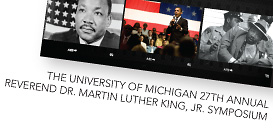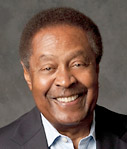
Before the Rev. Martin Luther King Jr. entered the pantheon of transcendent world leaders, his lawyer knew a man with a great sense of humor, who struggled to stop smoking, and who had encyclopedic knowledge of the Old Testament and The King James Bible.
“Dr. King preferred to be referred to as ‘A Minister of The Gospel’ rather than a civil rights leader,” says Clarence B. Jones, who contributed significantly to King’s “I Have a Dream” speech. Jones presents “Behind the Dream: The Making of the Speech that Transformed a Nation,” at 6 p.m. Jan. 21 in the Stephen M. Ross School of Business, Blau Auditorium.
Beyond King’s knowledge of the Bible — he held a doctorate in theology from the Boston University School of Theology — he was well-read in literature and political philosophy: William Shakespeare, Greek tragedies, Voltaire, Herbert Spencer, John Locke, Descartes, Karl Marx, Fredrik Engle, Charles Darwin, Hegel, Aristotle, Plato, Victor Hugo, Earnest Hemingway and W.E.B. Dubois, Jones says.
The process of writing speeches evolved. “It started with frequent requests for me, as his personal lawyer, preparing ‘informational memoranda’ about one or more subjects that might be the topic or subject matters of an address he had been asked to deliver,” Jones says.

Jones
This task grew into writing paragraphs King might consider. “This morphed into being requested to prepare the draft of one or more speeches from beginning to end. He would always insert or modify one or more paragraphs suggested,” Jones says.
Before the “I Have a Dream speech,” King and Jones talked several times about the general subject matter. It was for the March on Washington for Jobs and Freedom, Aug. 28, 1963. “I simply prepared on yellow line legal paper the text of suggested opening paragraphs he might want to consider using. Not until I heard him actually speak did I realize that he would use for the first six opening paragraphs of his speech the paragraphs I had written,” Jones says.
Jones, who serves as a scholar writer in residence and visiting professor at Stanford University, diversity visiting professor at the University of San Francisco, among other activities, will be the honoree, Jan. 19, of the African-American Museum, at the Smithsonian Institute, Washington, D.C.

